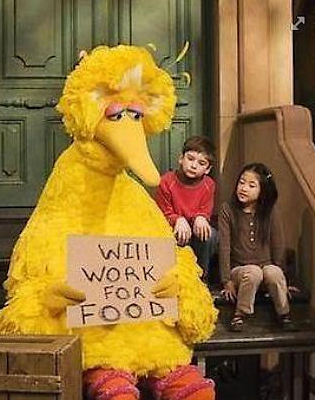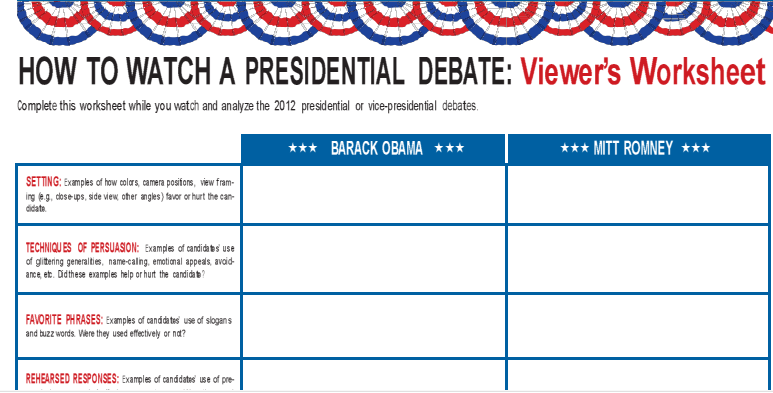 Oct. 4, 2012 Ask any kindergartener to assess the debates last night and you’d probably hear simple reactions like:
Oct. 4, 2012 Ask any kindergartener to assess the debates last night and you’d probably hear simple reactions like:
“He smiles more” or “He looks nicer” or “He looks like he didn’t study”…and frankly, they wouldn’t be too far off the national polls, from a stagecrafting and telegenic reverb perspective.
Of course, if you focus on content, Romney would quickly lose the K-crowd tossing Big Bird out of his nest at PBS with funding cuts, which became the “twitter moment” of the night, peaking at 17,000 tweets per minute.
When Romney said, “I’m sorry, Jim, I’m going to stop the subsidy to PBS. I’m going to stop other things. I like PBS, I love Big Bird. Actually I like you, too. But I’m not going to — I’m not going to keep on spending money on things to borrow money from China to pay for. That’s number one” the flap created Yahoo headlines claiming Big Bird won the debate and an insta-parody on Twitter @FiredBigBird which soared to about 30,000 follows as of this writing and is blinking in and out of ‘Twitter suspension’ for some reason.
Fact check: ABC News reports Romney’s intended cuts won’t ‘fire Big Bird’ so that should soothe some ruffled feathers, but I include this purposefully, as it’s part of my focus on how media translates into soundbites that ‘go viral’ based on emotional reaction with little regard to the issues, lots of “don’t mess with Big Bird” wins and some humorous ‘Big Bird memes’ and yougawdabekiddinme fun that hit the web pronto.
In the broader scope, I’m all for pop culture touchpoints that create SOME semblance of ‘likability’ and viewer interest, as long as we’re all aware that when debates distill into simplified, visceral ‘what I learned in kindergarten’ visualization of who ‘looks good or sounds good or who likes what’ it gives us a surreal snapshot of how deeply entrenched charisma and appearance-based cues dominate our culture.
We are fueling a nation that rewards style over substance, with content buried between the yawns and ‘you lost me at Dodd-Frank’ channel changers, though the truth is, we REALLY need to care more about media literacy.
Last thing we need is a nation built on Kardashian-ization of politics into vapid, surface-skimming…treating debates like an attention deficit video-game of hyperbole: “Boom! You lose; game over!”
We need to drill deeper into CONTENT of both candidates, assessing beyond ‘fact checking’ the debates, to discern nuance of record, history, declared intent, waffling, and spin-spotting which will help meaningfully frame what will ultimately impact each student. (Both candidates seemed to miss the mark on making social and geopolitical issues relevant on a direct, personal level, at the very least, we could have offered a Pro/Con.org list of topics and stances for students to use as sidebar shorthand!)
It’s not too late to gear up for the next round of debates…
Media literacy pro Frank Baker who wrote Lights, Camera Debate! What to Know Before You Watch offers excellent thinking tools and talking points for watching the debate with kids to deconstruct ‘how things work’ and lift the curtain on the Wizard of Oz about the fusion of persuasion and media messaging streaming 24/7 in our sound bite culture.
His materials get my vote hands down, not just for children’s use, but for adults seeking a nonpartisan analysis to ‘fact check the fact checkers’ in terms of media bias, point of view, reframing statistics and inherent complexities that come from a cultural conundrum of ‘too much information, not enough critical thinking.’ (ok, that’s my personal bias injected)
 Last night I used Frank Baker’s How to Watch a Presidential Debate: A Viewer’s Worksheet, and it’s chock full of my own chicken scrawls now.
Last night I used Frank Baker’s How to Watch a Presidential Debate: A Viewer’s Worksheet, and it’s chock full of my own chicken scrawls now.
It’s a FREE, handy, download to track persuasive techniques, emotional appeal, buzz words, rehearsed responses, non-verbal tics and foibles, even noting camera angles and cut-aways…
I was duly impressed with how easily the graph mirrored my own ‘aha’ moments with observational tidbits, and I added my own media layer ‘prediction game’ to see how many of the pullquotes from the candidates I wrote down ended up being recapped on the news.
Media moments of hyperbole, and colorful snippets like the Big Bird quote, the trillion dollar math, and use of phrases like “Donald Trump is a small business,” “some kids don’t have the option to borrow from their parents for school,” “12 wars on a credit card,” …became fun to track in real time reaction throughout the social media sphere.
Notably, when I scribbled on my Obama column, “distracted” I was a quick click away from checking in real time to see if something was blowing up somewhere…
That in itself gave me pause, thinking about how differently voters like me RECEIVE information, much less process cues during critical thinking…like a fast-forward button in our attention-based media economy.
My mind blipped quickly to “who’s got the President’s attention and why” which prompted me to open a window on the world with international live feeds, trending topics and a 24/7 global lens. The ability to add context quickly of what might be happening in ‘surround sound’ is amazing and noteworthy in itself, considering just years ago, we wouldn’t even have this option, much less the mindset of pulling up a multi-screen, multi-tasking triage peek at what ‘might’ be going on.
Introspectively, the fact that my mind ‘went there’ (shudder, ‘what if’…) and seamlessly used media to ‘check it out’ is in itself a brain processing difference between ‘then and now’ 21st century technology and how it’s impacted critical thinking channels in my own (overly analytical) noggin.
What else did you notice about HOW you watched the debates?
Did you flip between screens to ‘entertain’ yourself during professorial wonk-speak? Mirror disengaged teens with homework assignments channel surfing, “this is boring, what else is on?” Open mobile content or check in with peers on social media? View through a visual lens like watching the news with the sound off, asking arcane things that have nothing to do with the debates, like what’s up with the spot on Romney’s lapel pin? How we listen, watch, and consume media is part of the critical thinking piece too…
“He looks tired.” “He looks sad.” “He keeps interrupting!” My 4 and 6 year old kindergarten neighbors reported.
Hmn. Not so far off the pundits and pros first round evaluation as Post political reporter Melinda Henneberger summed, “The overall impression was that these two men are not as far apart as advertised, but only one had had his energy drink, and the other was hoping not to spend his next wedding anniversary in front of millions of people.”
Deciphering critical content amidst snore-fests, and assessing our own emotions and attitudes knowing when and why we ‘disengage’ is a distraction worth thinking about, not just for youth as emerging voters but for everyone who pumps up the ‘content is king’ message, especially in our society awash in appearance-based cues.
Otherwise if we’re unaware of our own foibles, we could end up parroting peers or flocking to the ‘viral du jour’…turning over the power of choice to what makes the best ‘entertainment,’ shades of a Jon Stewart vs Bill O’Reilly debate. That said…(and this is a nonpartisan site…)
Many wish they could vote for Big Bird as one thing’s for sure, the beloved beastie won the attention, hearts and minds of the debate audience for certain.
Helpful Resources for Critical Thinking: Election 2012
iCivics.org (great new interactive sim; + unit on media/influence)
5 sites to teach kids about politics (TechSavvy Parents)
Educating Kids About the Elections (CNN)
Project Vote Smart’s Political Courage Test
OpenSecrets.org (See Who’s Giving & Who’s Getting)
EXC: Election Resources to Share: School Library Journal Roundup
Simulations: Scholastic Kids Vote and What You Need to Know About Election 2012
Scholastic News Kids Press Corps
Simulations: Nickelodeon Kids Pick the President w/Linda Ellerbee
MTV Attempts to Draft Young Voters: Fantasy Football
Simulations: MTV Fantasy Election 2012
YOUNG kids/book: So You Want to Be President?
Related Reading on Shaping Youth by Amy Jussel
Shaping Youth: Stage Crafting Conventions: Media Literacy Tips for Kids
Shaping Youth: Kids and Voting: The Ultimate Show and Tell
Shaping Youth: Dear Media, Please Do Your Job…(Election Spinmeisters)
Shaping Youth: Will Kids Pick the President?
Shaping Youth: Project Vote Smart: Youth Hub for Critical Thinking Skills
Shaping Youth: GovTweets: A Snapshot of Election Dialogue
Shaping Youth: Did Jott the Vote Decide to Move On?
Shaping Youth: Using Mobile to Mobilize: Tapping Into Youth Info Needs
Resources via Frank Baker, Media Literacy Clearinghouse:
Role of Media in Elections: Help Students Spot the Spin (MLC)
Toss Up State Map With News Headlines
Teachable Moment: Watching The Debates With Students
What Students Should Know About Campaigns & The Media
Frank Baker Series of Interviews About 2012 Campaign (School Library Journal)








Dear Amy,
Thank you for the great information and links, especially the ones about financial disclosures of the parties and candidates.
The media literacy focus is helpful too.
I will look forward to using these materials during the debate focused upon foreign policy.
Glad they helped…I think the more we can use tools like these for critical thinking the less we end up in the voter booth with analysis paralysis making short-sighted decisions based on what ‘sounds like’ a good idea. Teens veering toward voter age especially could use a hand to instill the ol’ ‘what it sounds like vs what it really is’ deconstruction of everything from policy to practices… “spot the spin” we like to call it in medialit… heh. Thanks for taking the time to comment Adelaide!